|
|
|
Sort Order |
|
|
|
Items / Page
|
|
|
|
|
|
|
| Srl | Item |
| 1 |
ID:
151544
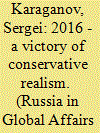

|
|
|
|
|
| Summary/Abstract |
In the winter of 2014, two months before the events in Crimea, when it was already clear that the confrontation with the West was getting increasingly tense, I read again Leo Tolstoy's War and Peace. I was struck by a phrase that had not caught my attention before: "A battle is won by those who firmly resolve to win it." I realized then that Russia would resolve and win.
|
|
|
|
|
|
|
|
|
|
|
|
|
|
|
|
| 2 |
ID:
151553


|
|
|
|
|
| Summary/Abstract |
Over the 25 years following the breakup of the Soviet Union, its legal successor, Russia, has walked a hard road, ridding itself of illusions and never stopping to search for answers to intricate questions that invariably arise as a new society and a new state take shape. The country was trying to get back to its own roots and to give a meaning to the dashing and hectic changes in the world around. This search is still far from achieving tangible long-term results, the more so because the global changes are about to enter a new stage, quite unexpected to many. However, some interim results are already available for analysis.
|
|
|
|
|
|
|
|
|
|
|
|
|
|
|
|
| 3 |
ID:
151550
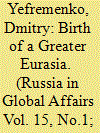

|
|
|
|
|
| Summary/Abstract |
Nearly twenty-five years separate two symbolic coincidences, each of which caused tectonic shifts in world politics. On December 8, 1991, a treaty signed in Belovezhye, Belarus, put an end to the Soviet Union; the following day the leaders of twelve Western European countries approved the Maastricht Treaty. On June 23, 2016, a majority of voters in the United Kingdom chose to leave the European Union. Around the same time India and Pakistan signed memorandums in Tashkent, Uzbekistan, to join the conventions of the Shanghai Cooperation Organization, thus bringing its membership to almost a half of the world's population.
|
|
|
|
|
|
|
|
|
|
|
|
|
|
|
|
| 4 |
ID:
151537
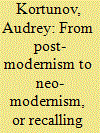

|
|
|
|
|
| Summary/Abstract |
It is common knowledge that the concept of post-modernism came into international relations lexicon from the French philosophy of the 1970s-1980s. Shortly before the end of the last great rise of French intellectual universalism, Jacques Derrida, Michel Foucault, Louis Althusser, Jacques Lacan and other founders and opponents of post-structuralism formulated the basic characteristics of postmodernism as an integral sociological and historical interpretation of the modern world.
|
|
|
|
|
|
|
|
|
|
|
|
|
|
|
|
| 5 |
ID:
151541
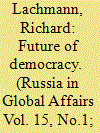

|
|
|
|
|
| Summary/Abstract |
Donald Trump won the presidential elections in the United States and became the new President. The Republicans control both the House and Senate again, even though the Democrats received more popular votes. The U.S. Constitution and biased district lines for the House gave the Republicans an advantage. Congressional Republicans are committed to quickly passing extreme neoliberal policies: eliminating Obamacare, privatizing Medicare (the health program for the elderly), public lands, and the student loan program. They also want to eliminate the Dodd Frank bill that regulated banks after 2008 as well as much environmental and workplace and consumer safety regulation. All these plans are the opposite of what Trump suggested he would do to protect (white) Americans who have been harmed by elites. We can look forward to a deeper nationalist/racist reaction, as American voters do not get the economic relief that Trump promised. We will see if the next step is a turn by those voters to the left (perhaps to a younger version of Bernie Sanders) or an eruption of violence against minorities, immigrants and intellectuals whom Trump no doubt will blame for his failings and betrayals.
|
|
|
|
|
|
|
|
|
|
|
|
|
|
|
|
| 6 |
ID:
151539
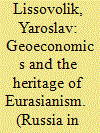

|
|
|
|
|
| Summary/Abstract |
When discussing Russia's pivot to the East and its key foreign economic priorities, it is important to remember Russian economic thought of the last century, the relevance and merits of which are yet to be studied. Conceived almost a hundred years ago, the theory of Eurasianism has played an important role in exploring transcontinental alliances and economic interaction between Europe and Asia. The theory holds that Russia's development should be based on what makes it distinct from other countries; namely, its geographical, historical, cultural, and economic peculiarities. Russia can advance economically by taking advantage of its geographical position between Europe and Asia as interaction intensifies between these two focal points of the global economy.
|
|
|
|
|
|
|
|
|
|
|
|
|
|
|
|
| 7 |
ID:
151546


|
|
|
|
|
| Summary/Abstract |
An informal remark by Russian Foreign Minister Sergei Lavrov made last year that there can be no "business as usual" with the West any more is a belated statement of fact. It reflects only one aspect of the fundamental transformations taking place in the world. Naturally, Russia's foreign policy cannot but respond to these changes, not just ad hoc but doctrinally.
|
|
|
|
|
|
|
|
|
|
|
|
|
|
|
|
| 8 |
ID:
151540


|
|
|
|
|
| Summary/Abstract |
There have been few people in top government positions whose moral and political authority did not diminish after their resignation, and still fewer have had the ear of political leaders. Among contemporary political thinkers, such figures include former U.S. Secretary of State Henry Kissinger, the father of the Chinese economic miracle Deng Xiaoping, and the founding father of Singapore Lee Kuan Yew. Yevgeny Primakov, of course, belongs to the same group.
|
|
|
|
|
|
|
|
|
|
|
|
|
|
|
|
| 9 |
ID:
151543
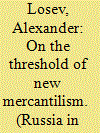

|
|
|
|
|
| Summary/Abstract |
The Soviet Union broke up twenty-five years ago, therefore it does not make much sense to explain in detail how much has changed since then in the public mind, in politics, and in the economy. Any anniversary is an occasion to look back in an attempt to find answers to questions such as: What trends have prevailed? What have we, Russians, lost and what have we gained? And what impact has the disappearance of the Soviet superpower had on the rest of the world?
|
|
|
|
|
|
|
|
|
|
|
|
|
|
|
|
| 10 |
ID:
151548
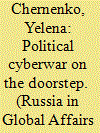

|
|
|
|
|
| Summary/Abstract |
As the 2016 U.S. presidential election drew near, tensions over cybersecurity issues heated up. On November 5, just three days before U.S. voters went to the polls, NBC News quoted a senior anonymous intelligence official and some classified documents as saying that "U.S. military hackers have penetrated Russia's electric grid, telecommunications networks, and the Kremlins command systems, making them vulnerable to attack by secret American cyber weapons should the U.S. deem it necessary."
|
|
|
|
|
|
|
|
|
|
|
|
|
|
|
|
| 11 |
ID:
151538
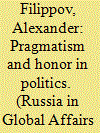

|
|
|
|
|
| Summary/Abstract |
The fall of 2016 marked the hundredth anniversary of an importantyethalf-forgotten documentin the history of political thought. On October 27, 1916 Max Weber delivered a report entitled Deutschland unter den europaischen Weltmachten ("Germany Among the European World Powers"). Shortly afterward it appeared in print in a special issue of Die Hilfe magazine, an influential periodical that politician of great authority Friedrich Naumann published for decades. After Weber's death, his article was repeatedly included in volumes of his selected political works and in the full collection of his works. Yet in contrast to his many other writings, it would never receive world acclaim. Even recently it was ignored by the editors of a Cambridge collection of Weber's political writings.
|
|
|
|
|
|
|
|
|
|
|
|
|
|
|
|
| 12 |
ID:
151536


|
|
|
|
|
| Summary/Abstract |
No matter what numerous political opponents and rivals, the liberal press, Hollywood stars, European leaders, minorities, and high-brow experts think of this man with dyed hair, the phrase "President Trump" will become one of the buzz words in world affairs in the years to come (and certainly during the next four years). Donald Trump is not a contingency or an alien that has come from Mars or Alpha Centauri to blow up the habitual earthly politics.
|
|
|
|
|
|
|
|
|
|
|
|
|
|
|
|
| 13 |
ID:
151549


|
|
|
|
|
| Summary/Abstract |
In the wake of the events in Crimea and southeastern Ukraine in the spring and summer of 2014, the United States, the European Union, Ukraine and some other countries imposed sanctions on Russia. Moscow responded with countermeasures. The term 'import substitution' began to be widely used in the Russian political vocabulary. This problem was particularly acute in the military-industrial sphere, as the production of a large number of Russian weapon systems at that time involved imported components, assemblies or materials. Denied access to them, Russia could fail to implement its State Armaments Program for 2011-2020 (SAP-2011).
|
|
|
|
|
|
|
|
|
|
|
|
|
|
|
|
| 14 |
ID:
151547


|
|
|
|
|
| Summary/Abstract |
The world is going to be an unstable and dangerous place in the next ten to twenty years. Demand for security and security-related products and services will keep growing. In this situation, Russia has a unique chance to use its ability to create a high-tech structure of global security and at the same time lay a new foundation for Eurasian cooperation. It is not just a technocratic model of development but a new philosophy of Russia's presence on the international stage that would be based on its deep-rooted political mentality (a higher sensitivity to issues of security and sovereignty) and that could turn its traditional conservative protective attitude into its effective positioning in the world.
|
|
|
|
|
|
|
|
|
|
|
|
|
|
|
|
| 15 |
ID:
151545
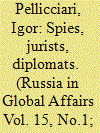

|
|
|
|
|
| Summary/Abstract |
The recent publication of numerous articles that try to analyze Vladimir Putins psychological profile—in the belief that this approach is enough to explain Russian policies—provides us with a useful occasion to present the following reflections on the main misunderstandings that are hovering today over the ground of Western countries, whenever they look at the Russian universe in order to understand its thoughts (not very successfully) and anticipate its moves (even less successfully).
|
|
|
|
|
|
|
|
|
|
|
|
|
|
|
|
| 16 |
ID:
151551


|
|
|
|
|
| Summary/Abstract |
The enthusiasm for the "pivot to the East," which emerged in Russia (somewhat unexpectedly even for the ideologists and advocates of this doctrine) after its stand-off with the West a few years ago, seems to be over. The reason may be the loss of illusions: not only some politicians but also businessmen and the public, doused by a cold shower of Western sanctions, at first hoped that they would easily find solace in a warm embrace of Eastern partners. Incidentally, in Russia's public perception "the East" includes almost the entire "non-West"—from the Atlantic coast of Morocco to the Japanese islands. Clearly, in this discourse "the East" simply does not exist in reality. But the persistence of the Soviet-era idea of "common destiny in the national liberation movement and anti-imperialist solidarity" fueled these expectations. Some people thought that Russia's "civilizational platform" was closer to the East than to the West, which would help the two parties find a common language, as before. In addition, some Eastern countries owed much to the Soviet Union which had helped them build a modern economic base; so it was believed that they should be more sensitive to Russia's needs. The very cliche of "Russia turning to the East" presupposed that Russia was the actor of this process, while the East was only the subject, interested in it in one way or another.
|
|
|
|
|
|
|
|
|
|
|
|
|
|
|
|
| 17 |
ID:
151542


|
|
|
|
|
| Summary/Abstract |
The world economy enters a new phase of prolonged recession and uncertainty. Over the past half-century globalization and underpinning international governance such as the WTO have led global economic growth. Since the global financial crisis of 2007-2008, however, the world economy has failed to create new growth engines. There seems no breakthrough in sight. Nevertheless, the international community is no longer capable of creating new global initiatives as major nations are struggling to tackle a variety of socioeconomic problems.
|
|
|
|
|
|
|
|
|
|
|
|
|
|
|
|
| 18 |
ID:
151552


|
|
|
|
|
| Summary/Abstract |
The great English journalist, writer, poet and novelist Joseph Rudyard Kipling wrote: "Oh, East is East and West is West and never the twain shall meet/Till Earth and Sky stand presently at God's great Judgment Seat." Most quoted is usually the first line of Kipling's ballad, while the mention of God's great Judgement Seat tends to be omitted more often than not. In the meantime, its meaning is of no small importance. Later it will be explained why.
|
|
|
|
|
|
|
|
|
|
|
|
|
|
|
|
|
|
|
|
|